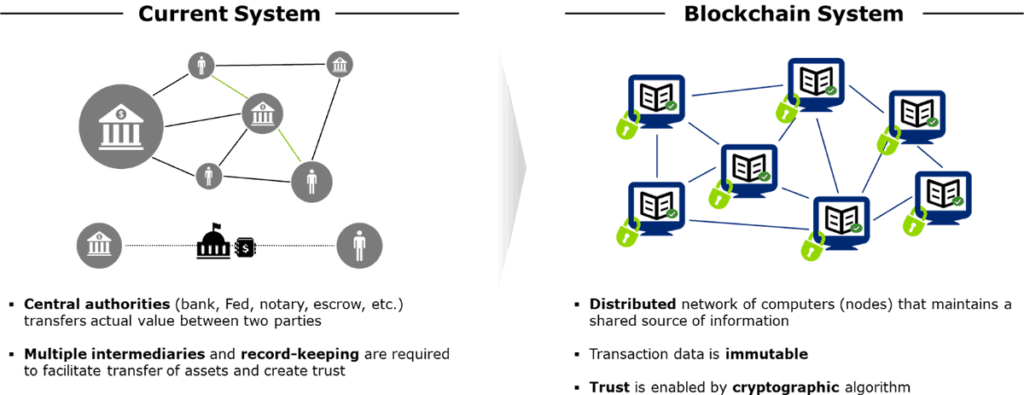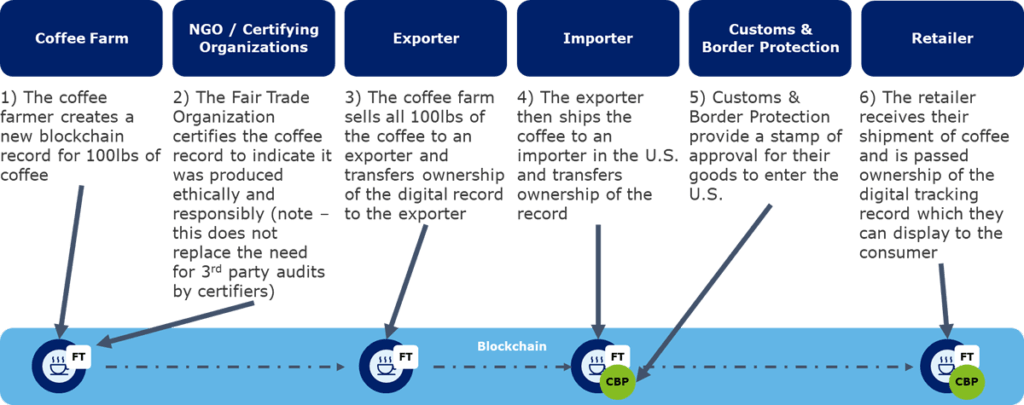Bitcoin, the earliest implementation of blockchain technology, has triggered the widespread experimentation of blockchain in a variety of industries and departments. For those who don’t know, in simple terms, blockchain is a technology that can allow authenticated data communication between each player in a supply chain without a trusted central organization intermediating. Blockchain resolves problems of disclosure and accountability between individuals and institutions whose interests are not necessarily aligned.

Although most of the investments to developing the technology has been steered towards its financial applications, an equally promising application of the technology is within supply chain relationships, whose complexity and diversity of interests pose exactly the kinds of challenges blockchain seeks to address.
Issues with the Current Supply Chain System
Today’s supply chain relies heavily on paper documentation to facilitate the movement of goods around the globe. The lack of a digital standard allows misinformation to permeate through the supply chain and results in counterfeits and irresponsible sourcing.
- Counterfeit goods account for $461 billion in trade annually
Due to the lack of transparency in goods movement around the globe, it can be difficult to detect the introduction of counterfeit goods into the supply chain. This problem is especially pertinent in pharmaceuticals, electronics, food, and luxury retail goods. In the case of luxury goods, it isn’t uncommon for manufacturers overseas to over-manufacture goods and sell identical merchandise out the back door.
- 10-30% of medicines sold in developing economies are counterfeits
Counterfeit medicines are among the most harmful counterfeit products to enter the global supply chain. Counterfeit medicines, in the best case scenario, will have no effect on the patients who use them. This is not always the case, however, and many of the counterfeit medications can cause further health complications or even death.
- Retailers face rising consumer demands for transparency
Retailers are facing the increasing demand for consumer transparency in the origins of their merchandise, most notably in the Food & Beverage sector. Reports of goods with ties to slavery, human trafficking, or child labor have become increasingly common in the media, prompting backlash from consumers. This provides new opportunity for brands, however, as an estimated 55% or more of consumers will pay a premium for services from companies promoting social responsibility.
Supply Chain Opportunity Through Digitalization
Digitalization of the goods movement process will facilitate the permeation of information throughout the supply chain which can help reduce the prevalence of counterfeits, help establish more transparent sourcing practices and as open up the opportunity to re-engineer trade finance processes. Entities that decide to incorporate blockchain technology within their supply chain operations will reap many benefits and will witness a more streamlined process that is secure and distributed, some of the most important benefits include:
Transparency & Confidence
Brands and retailers will be able to better trace back the source of their goods across the globe, ensuring that their goods have been sourced lawfully and responsibly
· Labels & seals
· Chain of custody
Information Consistency
Information will be consistent across the supply chain, reducing friction generated from discrepant or lost information as goods move through the supply chain
· Bill of Lading
Trade Finance
The added transparency could help re-engineer trade finance processes entirely, giving banks more visibility into the entire supply chain
· Letters of Credit
Blockchain Traceability in Action
Using a public or permissioned (consortium) blockchain creates a single audit trail for goods from origin to point-of-sale, and allows the qualities of an item like NGO certifications and government approval status to be managed digitally, helping streamline the supply chain operations and ensuring the accuracy of each stage.

That said, companies that are applying blockchain to their supply chain should follow a pragmatic, incremental approach during the implementation. We have witnessed that supply chain is facing major challenges today, hence, the demand for traceability and transparency has increased tremendously. Although blockchain is relying on immature technologies, this emerging trend has proven to have a steep growing curves that will definitely keep on soaring.
